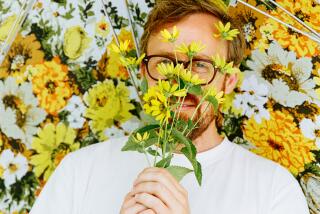Rainn Wilson gets spiritual in his memoir ‘The Bassoon King,’ and Dwight Schrute has something to say about it
The idea seems outlandish: Rainn Wilson, who brought power-obsessed Dwight Schrute to life on “The Office,” writing a book about spirituality?
“I kind of wanted to do a reader’s guide for young people about spirituality,” Wilson said recently at a Sherman Oaks diner. “Like, the essentials of life. It would be for anyone who was going on a spiritual journey and wanted to think about the concepts of spirituality.”
“The Bassoon King: My Life in Art, Faith, and Idiocy” (Dutton: 320 pp, $26.95), however, would become a different sort of book.
At the urging of his literary agent, Wilson turned his attention instead to writing about himself, “before people forget who Dwight is.” The result is something of a hybrid: a coming-of-age story and celebrity memoir in which faith and spirituality is a central force.
As is often the case with actors who play memorable characters, there’s a tendency for people to blur the line between real life and the screen. And sure, Wilson has his share of Dwight-like quirks — he had a pet sloth growing up, partook in weekend-long “Dungeons & Dragons” marathons and played the bassoon.
At the same time, the 49-year-old actor grew up under the teachings of the Bahá’í Faith, which preaches unity through diversity. As a young adult, after becoming “intimately acquainted” with drugs and alcohol and wrestling with the big questions, he found himself returning to the fold.
“You see someone on a TV show, you just assume, ‘Oh, they had a relatively normal life and then they went to college and they were in an improv troupe and then they did a few plays and then they started doing TV,’” Wilson said. “I hope that people will be entertained and surprised.”
Besides chronicling Wilson’s spiritual journey, “The Bassoon King” traces the actor’s winding road from a “bone-numbingly nerdy” kid with an unusual name and distinctly shaped head to a successful actor and comedian.
There are tales of his hippie-ish parents, who divorced when he was young, and of his time living in Nicaragua. Wilson acknowledges career setbacks, such as a failed “Office” follow-up TV series (Fox’s “Backstrom”) and the box office dud “The Rocker.”
In recounting the latter experience, Wilson remembers listening to the radio in his car not long after the movie’s release as disc jockeys mocked the film’s failure.
“I started to cry, tears sliding down my cheeks, driving down the pitch-black, predawn 101 to my job at ‘The Office,’ where, fortunately, the cast and crew cheerily and diplomatically didn’t mention the film or ask how it performed,” he writes. “Thank God I had a pretty good day job.”
As we might expect, that day job gets plenty of mention. Steve Carell sweated so much, Wilson tells us, that the set had to be kept at 64 degrees; there are also tidbits about other cast members and their entanglements, including the real-life complicated relationship between B.J. Novak and Mindy Kaling. Indeed, Wilson wrote the book’s introduction in the voice of Dwight — an undertaking that surprisingly did not come as easily.
“It was really hard for me,” Wilson said. “I can react in the moment as Dwight. But I never wrote episodes or dialogue as Dwight. So I wrote a first draft … a much less funny first draft of Dwight’s introduction, and I got notes and punch-ups from B.J. Novak [and writer-producers] Greg Daniels and Paul Lieberstein. They were able to really elevate it.”
Wilson said he read other celebrity memoirs and essay collections in preparing to write his own.
“Some you finish reading and you realize you don’t know more about the person than when you started,” he said. “You literally don’t know anymore about them, which you think is impossible, because you just read 300 pages from them. I knew I didn’t want my book to be that. If anything, I tell too much, and people might be like, ‘Oh, my God, enough, Rainn, with the soul-baring ...’”
Still, while Dwight in the introduction questions why “this privileged Hollywood windbag” is writing a memoir in his 40s, Wilson thinks the time is right.
“I’m really glad I wrote it because if I walked out of this interview and I got hit by a bus on Ventura Boulevard, this book is my life story,” Wilson said under the fluorescent lights of the diner. “It’s my observations, my ups and downs, loves and hates. There will be a document for my grandchildren to look at. Like, ‘Oh, you want to know what your grandfather was like? Here, this is him.’”
More to Read
Sign up for our Book Club newsletter
Get the latest news, events and more from the Los Angeles Times Book Club, and help us get L.A. reading and talking.
You may occasionally receive promotional content from the Los Angeles Times.







